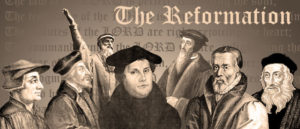The Reformation
Sometimes it seems that out of nowhere God suddenly decides to move. Truthfully, He is aligning the world with His purposes and the things done in secret, out of sight, appear; it wasn’t suddenly, it was alignment and timing. Like a seed planted in the ground, you see no evidence that anything is being accomplished … but it is. Underground, in the dark, the seed coat is splitting, the roots are extending, and the little seedling finally pushes through.
The Reformation of 1517 reflects that analogy. It wasn’t about a single person, Martin Luther, a seedling pushing through to the light, it was about many people working for centuries preparing the way, seemingly underground. The word reform means to improve something by correcting error, removing defects, consequently, transforming it into a better condition. God wanted reformation then and He wants it today.
During the first 500 years of the Church, the teachings of the apostles and our church fathers began to wane as the centralized church in Rome gained wealth and influence. The ‘rule of faith’ passed down from the apostles wasn’t as clear and transforming as it had been in the beginning, however, God was stirring hearts at various times and places around Europe: enter Augustine. His personal, passionate faith and teachings carried the Church into the next 500 years: grace alone, faith alone, Scripture alone. He is still considered the most influential of the church fathers to both the Roman Catholic and the Protestant churches today.
The second 500 years (500AD-1000AD) brought the monastic movement, monks and priests, highlighting prayer and intimacy with God as well as preaching and teaching in the community. Great theologians like Anselm and Aquinas brought reform and returned to the teachings of Augustine that swept Europe. People were increasingly hungry for God.
The third 500 years (1000AD-1500AD) gave us great Bible translators, preachers, and teachers like Wycliff and Huss. In the midst of persecution, expulsion, and even execution they were forerunners for The Reformation. God seemed to be focusing on the authority of scripture over church tradition and the necessity of everyone, everywhere, reading the Word of God. Interestingly, the bishop who burned Huss at the stake was buried under the place where Luther was ordained. Huss’s prophecy at his execution reads “you may cook this goose, (his name meant goose) but a swan is coming whom you will not silence.”
Our quincentennial (1517-2017) or 500 years, provides the church with a reform of words. The Reformation was centered on words of encouragement that God’s grace alone saved you, that faith alone received His love, and scripture alone confirmed His love. Whether it was Erasmus from inside the church or Luther from the outside, the Holy Spirit was guiding us back to Himself.
Truly, truly I say to you, unless a grain of wheat falls into the earth and dies, it remains alone; but if it dies, it bears much fruit. John 12:24
We’ll focus on Luther’s impact next week.

